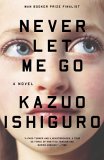Summary | Excerpt | Reading Guide | Reviews | Beyond the Book | Readalikes | Genres & Themes | Author Bio

There have been times over the years when I've tried to leave Hailsham
behind, when I've told myself I shouldn't look back so much. But then there came
a point when I just stopped resisting. It had to do with this particular donor I
had once, in my third year as a carer; it was his reaction when I mentioned I
was from Hailsham. He'd just come through his third donation, it hadn't gone
well, and he must have known he wasn't going to make it. He could hardly
breathe, but he looked towards me and said: "Hailsham. I bet that was a
beautiful place." Then the next morning, when I was making conversation to keep
his mind off it all, and I asked where he'd grown up, he mentioned some place in
Dorset and his face beneath the blotches went into a completely new kind of
grimace. And I realised then how desperately he didn't want reminded. Instead,
he wanted to hear about Hailsham.
So over the next five or six days, I told him whatever he wanted to know, and
he'd lie there, all hooked up, a gentle smile breaking through. He'd ask me
about the big things and the little things. About our guardians, about how we
each had our own collection chests under our beds, the football, the rounders,
the little path that took you all round the outside of the main house, round all
its nooks and crannies, the duck pond, the food, the view from the Art Room over
the fields on a foggy morning. Sometimes he'd make me say things over and over;
things I'd told him only the day before, he'd ask about like I'd never told him.
"Did you have a sports pavilion?" "Which guardian was your special favourite?"
At first I thought this was just the drugs, but then I realised his mind was
clear enough. What he wanted was not just to hear about Hailsham, but to
remember Hailsham, just like it had been his own childhood. He knew he was close
to completing and so that's what he was doing: getting me to describe things to
him, so they'd really sink in, so that maybe during those sleepless nights, with
the drugs and the pain and the exhaustion, the line would blur between what were
my memories and what were his. That was when I first understood, really
understood, just how lucky we'd been—Tommy, Ruth, me, all the rest of us.
Driving around the country now, I still see things that will remind me of
Hailsham. I might pass the corner of a misty field, or see part of a large house
in the distance as I come down the side of a valley, even a particular
arrangement of poplar trees up on a hillside, and I'll think: "Maybe that's it!
I've found it! This actually is Hailsham!" Then I see it's impossible and I go
on driving, my thoughts drifting on elsewhere. In particular, there are those
pavilions. I spot them all over the country, standing on the far side of playing
fields, little white prefab buildings with a row of windows unnaturally high up,
tucked almost under the eaves. I think they built a whole lot like that in the
fifties and sixties, which is probably when ours was put up. If I drive past one
I keep looking over to it for as long as possible, and one day I'll crash the
car like that, but I keep doing it. Not long ago I was driving through an empty
stretch of Worcestershire and saw one beside a cricket ground so like ours at
Hailsham I actually turned the car and went back for a second look.
We loved our sports pavilion, maybe because it reminded us of those sweet
little cottages people always had in picture books when we were young. I can
remember us back in the Juniors, pleading with guardians to hold the next lesson
in the pavilion instead of the usual room. Then by the time we were in Senior
2—when we were twelve, going on thirteen—the pavilion had become the place to
hide out with your best friends when you wanted to get away from the rest of
Hailsham.
Excerpted from Never Let Me Go by Kazuo Ishiguro Copyright © 2005 by Kazuo Ishiguro. Excerpted by permission of Knopf, a division of Random House, Inc. All rights reserved. No part of this excerpt may be reproduced or reprinted without permission in writing from the publisher.
Your guide toexceptional books
BookBrowse seeks out and recommends the best in contemporary fiction and nonfiction—books that not only engage and entertain but also deepen our understanding of ourselves and the world around us.